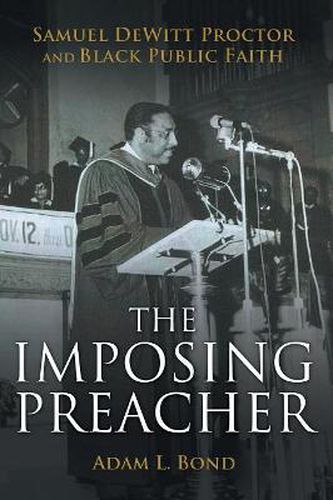Readings Newsletter
Become a Readings Member to make your shopping experience even easier.
Sign in or sign up for free!
You’re not far away from qualifying for FREE standard shipping within Australia
You’ve qualified for FREE standard shipping within Australia
The cart is loading…






As a distinguished Baptist pastor, educator, and public servant, Samuel DeWitt Proctor made it his mission to serve American life by fighting against racism. In The Imposing Preacher, Adam Bond shows how Proctor, as the product of a prophetic black church tradition, a social gospel-laced liberal Protestantism, and a black middle-class integrationist ethos, envisioned a type of pulpit activism through which the United States could realize a civil society and genuine community, and was able to anticipate and contest some of the themes articulated in the black religious movements of the late twentieth century. Bond shows Proctor to be a public theologian committed to developing an inclusive and racially pluralistic global society that confronts racism as the social crisis of its time. Proctor did not respond to segregation through marches and visible protests. Instead he saw the classroom and the pulpit as the sacred spaces for dialogue about race in America. In this way, he presents an alternative model of religious and social leadership and for studies of African American religion in the twentieth century.
$9.00 standard shipping within Australia
FREE standard shipping within Australia for orders over $100.00
Express & International shipping calculated at checkout
As a distinguished Baptist pastor, educator, and public servant, Samuel DeWitt Proctor made it his mission to serve American life by fighting against racism. In The Imposing Preacher, Adam Bond shows how Proctor, as the product of a prophetic black church tradition, a social gospel-laced liberal Protestantism, and a black middle-class integrationist ethos, envisioned a type of pulpit activism through which the United States could realize a civil society and genuine community, and was able to anticipate and contest some of the themes articulated in the black religious movements of the late twentieth century. Bond shows Proctor to be a public theologian committed to developing an inclusive and racially pluralistic global society that confronts racism as the social crisis of its time. Proctor did not respond to segregation through marches and visible protests. Instead he saw the classroom and the pulpit as the sacred spaces for dialogue about race in America. In this way, he presents an alternative model of religious and social leadership and for studies of African American religion in the twentieth century.